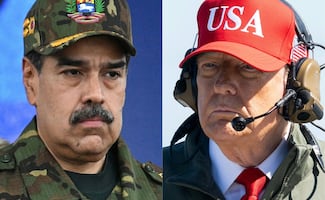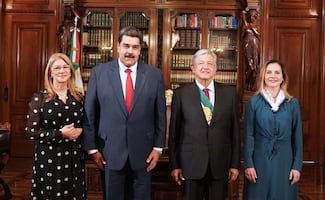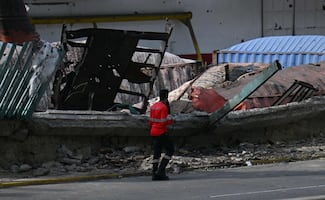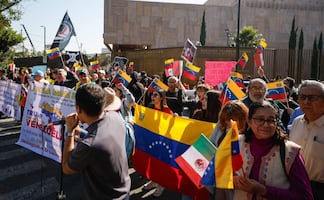Más Información

Captura de Maduro: Así es el USS Iwo Jima (LHD-7), el buque de asalto anfibio que traslada al líder venezolano a EU
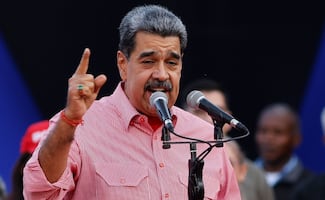
EU captura a Nicolás Maduro: Así fue “Absolute Resolve”, la operación para detener al líder venezolano

Países de AL han buscado a México tras ataque de EU a Venezuela, dice Sheinbaum; hace un llamado a la unidad
Mexico City's mayor said Monday that no expense will be spared and no line of investigation ignored in the hunt for the killers of four women and a photojournalist, who had fled the state where he worked fearing for his safety.
The United Nations High Commission on Human Rights condemned the killings, saying that the bodies had signs of torture and sexual violence and that the climate of impunity "is one of the obstacles to practicing freedom of expression in Mexico."
"We are all outraged by this crime," Mayor Miguel Ángel Mancera said at a news conference. "There will be no impunity in this matter. No line of investigation will be discarded."
Journalist protection groups have expressed fears that authorities won't consider the killing of Rubén Espinosa, 31, as being related to his work, even though colleagues say he had fled his work in Veracruz state out of fear.
The office of the capital's chief prosecutor said late Monday in a statement that investigators had found a red Ford Mustang linked to one of the victims abandoned in a neighborhood to the south. They believe it belonged to a 29-year-old woman who they think is Colombian but have not identified yet.
The statement also said the building's security camera was damaged and did not contain video of the scene.
Prosecutor Rodolfo Ríos Garza said Sunday that authorities were following protocols for crimes against journalists and crimes against women as well as looking at robbery as a possible motive in the case.
But when dealing with slayings of journalists, authorities in Mexico historically have been quick to discard their work as a motive, though the country is the most dangerous in Latin America for reporters. Some 90 percent of journalist murders in Mexico since 1992 have gone unpunished, according to the Committee to Protect Journalists.
"What's particularly pernicious is that violence against the press is violence against society," said Darío Ramírez, director of the Article 19 free press advocacy group. "There are many places in the country where silence paves the road so that organized crime, corruption, everything that destroys a society can continue in a manner without ... setbacks or obstacles."
Espinosa was buried Monday after a private memorial service.
The city prosecutor's office said it was waiting on tests to confirm reports that the victims were tortured and that some of the women may have been sexually assaulted.
An official from the prosecutor's office said three of the female victims had been identified, but a fourth, presumed to be Colombian, had not.
Ríos gave their women's ages as 18, 29, 32 and 40. All were shot in the head with a 9 mm weapon. Espinosa sustained severe injuries to his face before he was killed, Ramírez said.
Ríos also said the apartment was ransacked and robbed. Three of the women lived there and a fourth was the housekeeper. One woman was a friend of Espinosa's from Veracruz, where he had worked for eight years.
The bodies were found late Friday in a middle-class neighborhood. The building was in range of several security cameras on the street and Ríos said officials have video evidence in the crime. The attackers would have had to go through two doors to get inside and neither had signs of damage or a break-in.
Friends said Espinosa had fled Xalapa, the capital of Veracruz, to Mexico City in June after saying that unknown people were following him, taking his photograph and harassing him outside his home.
The Gulf coast state has been a dangerous place for reporters, with 11 journalists killed since Gov. Javier Duarte took office in 2010. Two more, including Espinosa, have been killed outside the state and three have gone missing.
Duarte's office issued a statement Monday saying he had called Mexico City's mayor to offer his support in the investigation and instructed Veracruz's top prosecutor to collaborate with his Mexico City counterpart. A day earlier, he had called the killings "aberrant."
Fears that Espinosa's death could end unpunished were fueled by Sunday's news conference, when Ríos never acknowledged that Espinosa had sought in Mexico's capital, saying he came to the city for "professional opportunities." The comment led to shouts and protests from reporters.
Espinosa worked for the investigative newsmagazine Proceso and other media outlets
In June, Duarte accused some reporters of being involved in organized crime.
"We all know who is involved in the underworld," Duarte said. "There's no reason to confuse freedom of expression with representing the expression of criminals via the media."
Article 19, the advocacy group, said Espinosa's death was a milestone in violence against the press because he was the first journalist to be killed in exile in the capital. The agency said in the last five years it has helped about 70 journalists under threat find refuge in the capital.
Noticias según tus intereses
[Publicidad]
[Publicidad]






